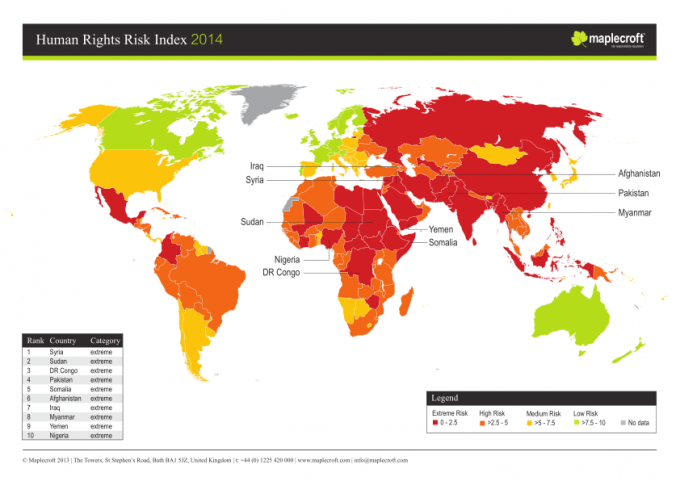10 things to know about human rights


Get involved with our crowdsourced digital platform to deliver impact at scale
Stay up to date:
Human Rights
Human Rights Day is held on 10 December every year to promote the rights and freedoms of people across the globe.
The annual event marks the adoption of the United Nation’s Universal Declaration of Human Rights in December 1948. UN Secretary General Ban Ki-Moon says of the day: “On Human Rights Day, let us recommit to guaranteeing the fundamental freedoms and protecting the human rights of all.”
This map highlights the human rights situation around the world.
While there is a lot to know about human rights – there are 30 basic rights in the UN declaration – here is a round-up of a few facts that might surprise you.
- In 2011, the United Nations declared internet access a basic human right.
- The concept of human rights is said to have originated some 2,500 years ago in modern-day Iraq. King Cyrus the Great freed slaves, established racial equality and the right to religious choice.
- Everyone has a right to leisure and holiday, with pay.
- Twenty-three nations around the world currently allow gay marriage.*
- There are more than 300,000 child soldiers in conflicts around the world.
- The Universal Declaration of Human Rights is the most translated document in the world. It is available in 370 languages.
- Nearly 21 million people around the world are the victims of forced labour.
- Nepal is one of at least five countries where your gender can now appear as “other” on official documentation.
- 121 million children and adolescents have never had the chance to attend school, or have been forced to drop out.
- During 2015 alone, the death penalty has been abolished in four countries.
* Northern Ireland does not allow same-sex marriage, and in Mexico it is only legal in some jurisdictions.
All facts are correct as of 9 December 2015.
Have you read?
What is modern slavery?
What is the business view on human rights?
What are your digital rights?
To keep up with the Agenda subscribe to our weekly newsletter.
Author: Emma Luxton is a Junior Content Producer at Formative Content. Joe Myers is a Digital Content Producer at Formative Content.
Image: People cross a street in Mong Kok district in Hong Kong, October 4, 2011. REUTERS/Bobby Yip
Don't miss any update on this topic
Create a free account and access your personalized content collection with our latest publications and analyses.
License and Republishing
World Economic Forum articles may be republished in accordance with the Creative Commons Attribution-NonCommercial-NoDerivatives 4.0 International Public License, and in accordance with our Terms of Use.
The views expressed in this article are those of the author alone and not the World Economic Forum.
The Agenda Weekly
A weekly update of the most important issues driving the global agenda
You can unsubscribe at any time using the link in our emails. For more details, review our privacy policy.
More on Civil SocietySee all
John Letzing and Minji Sung
April 9, 2024
Marie McAuliffe
April 8, 2024
Mel Young
March 29, 2024
Liam Coleman
March 7, 2024
Laura M. Cha
March 6, 2024
Peter Giger
January 11, 2024







